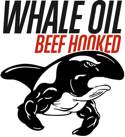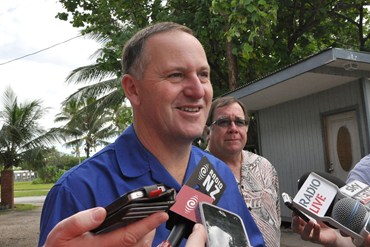 New Zealand’s highest traffic blog is Cameron Slater’s Whale Oil Beef Hooked (try saying it in an Irish accent) — an aggressive right-wing sensationalist blog not noted for its delicate approach to current affairs. Unsurprisingly, Slater is an outspoken climate pseudoskeptic, with a long history of posts rubbishing climate science and the reality of climate change. This morning’s effort — The Cognitive Dissonance Of The Media On Climate Change — is pretty much par for Slater’s course, but riffs on an interesting new paper about the potential for serious additional ice loss from Antarctica which has been getting quite a bit of local media coverage (Stuff, RNZ News).
New Zealand’s highest traffic blog is Cameron Slater’s Whale Oil Beef Hooked (try saying it in an Irish accent) — an aggressive right-wing sensationalist blog not noted for its delicate approach to current affairs. Unsurprisingly, Slater is an outspoken climate pseudoskeptic, with a long history of posts rubbishing climate science and the reality of climate change. This morning’s effort — The Cognitive Dissonance Of The Media On Climate Change — is pretty much par for Slater’s course, but riffs on an interesting new paper about the potential for serious additional ice loss from Antarctica which has been getting quite a bit of local media coverage (Stuff, RNZ News).
Slater’s complaint is straightforward enough: he relies on Monckton’s latest temperature trend cherry pick at µWatts and Climate Depot to demonstrate that there’s “no global warming for the last 17 years and 9 months”, shows a graph of the current increase in Antarctic sea ice, and then complains that because the NZ media has given prominence to a new study by Matthias Mengel and Anders Levermann at the Potsdam Institute ((M. Mengel, A. Levermann. Ice plug prevents irreversible discharge from East Antarctica. Nature Climate Change, 2014; DOI: 10.1038/NCLIMATE2226)) that finds that a large chunk of the East Antarctic ice sheet could be vulnerable if warming continues, then the media must be biased. As he puts it:
These scaremongering scenarios really do show the cognitive dissonance of the mainstream media and their inability to look dispassionately at the evidence before us, instead they push political lines. All of their stories have “could”, “should”, “might” and “maybe” qualifiers.
Unfortunately, Slater’s the one with the cognitive dissonance. His “dispassionate” look at the evidence is anything but, and his aggressive rejection of the new ice sheet evidence — “This report doesn’t sound plausible at all, it sounds like horse crap to me” — appears to be based entirely on his own lack of understanding of ice sheet dynamics. Continue reading “Whale meat again – Slater’s climate pseudoskeptic siren songs”

 As expected, the New Zealand government’s response to the IPCC’s Working Group 3 report on mitigating climate change pays lip service to the science, while maintaining that NZ is doing all that can be expected. Climate change minister Tim Groser’s
As expected, the New Zealand government’s response to the IPCC’s Working Group 3 report on mitigating climate change pays lip service to the science, while maintaining that NZ is doing all that can be expected. Climate change minister Tim Groser’s  In this week’s post at The Daily Blog —
In this week’s post at The Daily Blog —  The New Zealand Government has taken refuge from the challenge of climate change by recasting it as a matter of political positioning. This is nowhere more clearly seen than in the frequently reiterated claim that we are doing our “fair share” in the international effort to reduce emissions. It’s a brash claim in any case, when our unconditional 5 percent reduction target on 1990 levels by 2020 is compared with the 30 percent unconditional target of Norway and Switzerland or the 20 percent target of the EU as a whole. But the Government prefers comparison with our “trading partners” Australia, America and Canada, and also largely excludes the emissions associated with farming on the grounds that the world needs the food we produce.
The New Zealand Government has taken refuge from the challenge of climate change by recasting it as a matter of political positioning. This is nowhere more clearly seen than in the frequently reiterated claim that we are doing our “fair share” in the international effort to reduce emissions. It’s a brash claim in any case, when our unconditional 5 percent reduction target on 1990 levels by 2020 is compared with the 30 percent unconditional target of Norway and Switzerland or the 20 percent target of the EU as a whole. But the Government prefers comparison with our “trading partners” Australia, America and Canada, and also largely excludes the emissions associated with farming on the grounds that the world needs the food we produce.